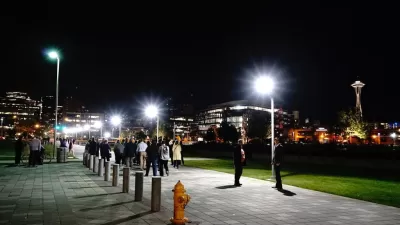A new study looks at how growing up and living in cities can affect how people process stress.
In this post from Per Square Mile, Tim De Chant reviews the paper.
"The paper is the first of its kind, merely lifting the corner of a page in what is likely to be a huge tome of neuroscientific discoveries on how urban life affects the development of our brains and how we react to the populous world around us. The study's sample size is somewhat limited, but the results are statistical home runs. And like many pioneering studies, it raises many more questions than it answers.
The Germany-based researchers started by administering a difficult math test to 34 college students. While the students were taking the test, the researchers harangued them about their substandard score or slow progress to stimulate social stress. All the while, functional magnetic resonance imaging machines (fMRI) scanned the students' brains, recording their activity. After the test and scans were completed, the researchers weighed the students' patterns of brain activity against their place of upbringing-big city, small town, or rural area. Subjects who were raised in the city exhibited higher levels of activity in their amygdala, a region of the brain which processes emotion, and cingulate cortex, an area which regulates the amygdala. The results were so powerful that the scientists conducted a follow up experiment to be doubly certain. That study confirmed the findings of the first."
FULL STORY: This is your brain in the city

Planetizen Federal Action Tracker
A weekly monitor of how Trump’s orders and actions are impacting planners and planning in America.

Maui's Vacation Rental Debate Turns Ugly
Verbal attacks, misinformation campaigns and fistfights plague a high-stakes debate to convert thousands of vacation rentals into long-term housing.

San Francisco Suspends Traffic Calming Amidst Record Deaths
Citing “a challenging fiscal landscape,” the city will cease the program on the heels of 42 traffic deaths, including 24 pedestrians.

Defunct Pittsburgh Power Plant to Become Residential Tower
A decommissioned steam heat plant will be redeveloped into almost 100 affordable housing units.

Trump Prompts Restructuring of Transportation Research Board in “Unprecedented Overreach”
The TRB has eliminated more than half of its committees including those focused on climate, equity, and cities.

Amtrak Rolls Out New Orleans to Alabama “Mardi Gras” Train
The new service will operate morning and evening departures between Mobile and New Orleans.
Urban Design for Planners 1: Software Tools
This six-course series explores essential urban design concepts using open source software and equips planners with the tools they need to participate fully in the urban design process.
Planning for Universal Design
Learn the tools for implementing Universal Design in planning regulations.
Heyer Gruel & Associates PA
JM Goldson LLC
Custer County Colorado
City of Camden Redevelopment Agency
City of Astoria
Transportation Research & Education Center (TREC) at Portland State University
Jefferson Parish Government
Camden Redevelopment Agency
City of Claremont




























